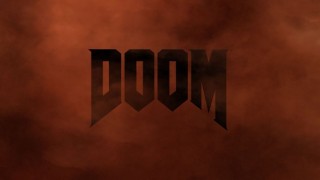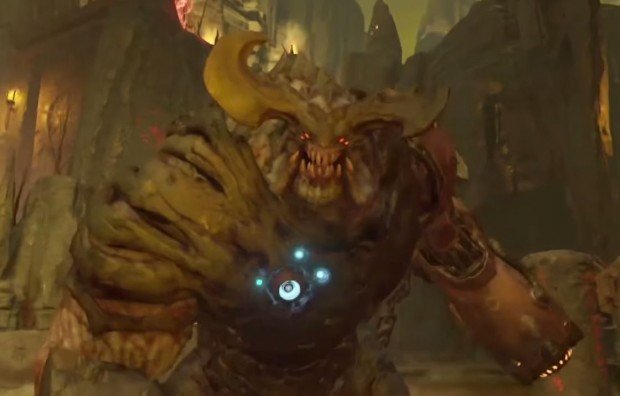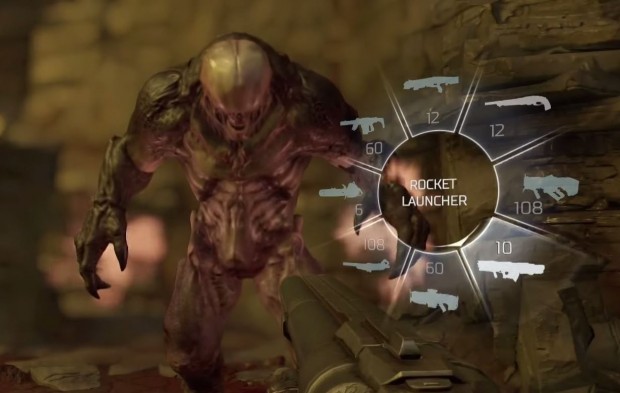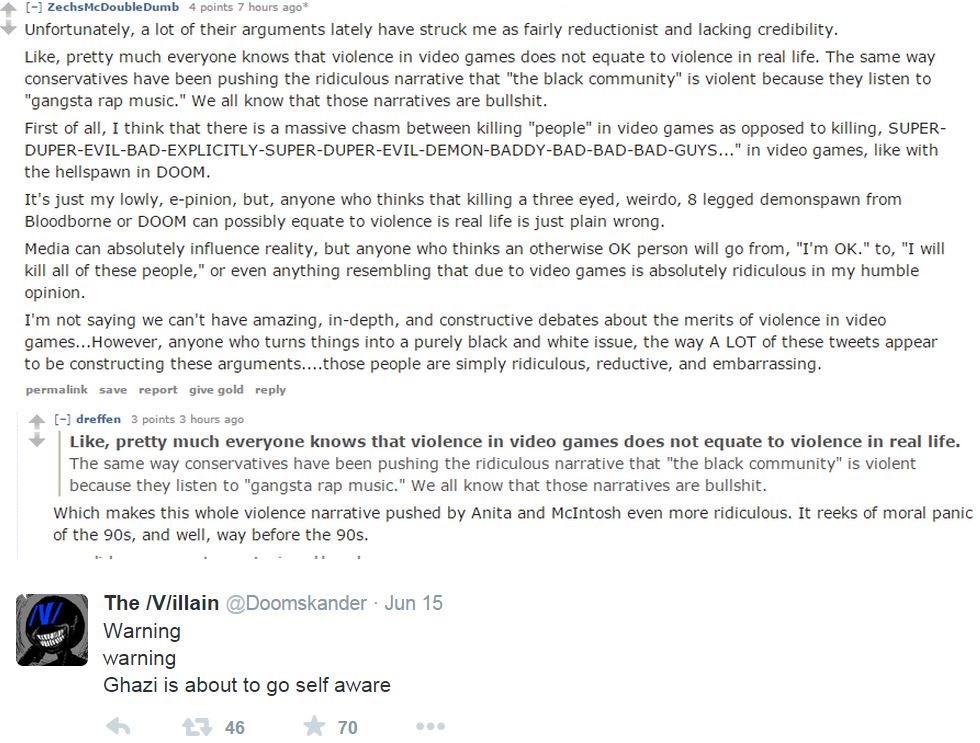
What Doom really needs is for its socially transformed monsters to sit around in a big circle and really talk about their feelings. Gone are the days of bloodlust and dismemberment; these hell demons have had enough, and are sick of expressing their dissatisfaction through violence. While they’re at it, they can mock and deride the #GamerGate movement for its wanton misogyny and affiliations with the wicked overlords of 4chan, 8chan and whatever other chans are currently in existence.
Of course, this is probably some of the nonsensical, crackpot rhetoric being spewed forth from some of the more mainstream (dumbed down) media outlets, and their incessantly talking “talking heads.” Indeed, in the wake of the biggest gaming expo of the year, E3, a number of high-profile figures vented their disgust at the latest footage of Doom and Fallout 4, including the gaming industry’s ever-resident sadomasochist Anita Sarkeesian.
Is Bethesda Sarkeesian’s new whipping boy?
E3 kicked off, in fine fettle, with Bethesda’s rather splendid video game wares. The Maryland-based publisher showcased Fallout 4, Dishonored 2, Battlecry and, of course, id Software’s Doom. Doom was first up, with id Software Executive Producer Marty Stratton presenting several minutes of gameplay footage, replete with gibbing, arm-ripping, chainsaw-wielding action. Rather predictably, the more visceral elements of the game (all of it) created a hullabaloo among some of the more conservative members of the audience.

“This level of extreme violence shouldn’t be considered normal. It’s not an excuse to say it’s expected because DOOM. That’s the problem.”
Sarkeesian followed this up by claiming it was “… really troubling (and depressing) that the #BE3 audience is enthusiastically cheering for bodies being ripped apart.”

The problem with this statement is several-fold. Sarkeesian fails to understand or appreciate the puerile, over-the-top nature of the Doom franchise. And because she doesn’t understand or like it, she immediately condemns it.
Admittedly, when it comes to Doom, there’s little to even try and understand. It’s a simple franchise that takes a somewhat “storytelling-lite” approach, focusing its attention towards attuning the fluidity and mechanics of the gameplay. It’s always been that way, and probably always will. Shoehorning a half-baked plot (that nobody was asking for) into a franchise that wouldn’t benefit from one is pointless, and an utter waste of time and resources. You want an intricate storyline with deep and engaging characters, and enough feels to make your bottom lip quiver from your face? Then, try a different video game.
Doom is violent, therefore all video games must be violent!
Trying to misrepresent this situation as being “typical” of the gaming industry, as culture critic and Feminist Frequency co-collaborator Jonathan McIntosh recently alluded to, is downright dishonest. Games of this über-violent nature are few and far between, and the industry - while continually growing and maturing - has a wide variety of titles to suit the most eclectic of tastes. From Portal to Beyond Good and Evil; from Hatoful Boyfriend to Among the Sleep; from GRID to Shovel Knight; The Stanley Parable to Ori and the Blind Forest. The list is endless.

“I can barely watch,” snorts Anita Sarkeesian. Let’s be blunt: then don’t watch it! If you don’t like something, or it “offends” you - or it gives you heart palpitations and makes your nervous spleen burst out of your fragile body - you might want to consider doing something else. Perchance Nintendo’s E3 conference? An entirely different expo? Maybe a different career?
Plenty of people don’t appreciate blood, guts and violence, and that’s absolutely fine. What isn’t OK is asking video game developers to stop making violent video games altogether, just like asking a director of horror movies not to make visceral, gory productions is probably going to be a very badly received piece of advice.
Remember when this guy asked Quentin Tarantino about the violence depicted in his films?
I, just like so many others, don’t like romantic comedy films. I find most of them to follow a clichéd, contrived and unoriginal format. However, I also understand that romcoms form part of a lucrative industry, and many people gain immense pleasure from watching them. I’m not going to stamp my feet and demand that Hollywood ceases production of these titles. Who am I to tell people what they can and can’t view?
What’s equally frustrating is listening to the condescending way in which Sarkeesian and McIntosh talk about the gaming community, as if its full of unthinking, intellectually inferior, children. In another redacted Twitter post, McIntosh said there was “something deeply deeply seriously wrong” with anyone cheering the latest Doom footage.
These remarks are divisive and unhelpful, and don’t further any meaningful discourse about violence in video games. They also sound as if they’re coming from a deep well of narcissism and self-importance. A rough translation, if you will:
“Listen to these idiot people, brainlessly clapping and cheering for this long-awaited video game. We’re better than they are, and have the solemn duty of rebuking their passion.”
What level of censorship would ever make these people happy?
This does, however, present a problem with the way Sarkeesian and company view violent depictions, the way in which fictional violence is/should be resolved, and what they expect video game developers to do. Adults are perfectly entitled to indulge in whatever lawfully permissible books, television, movies or video games that they wish. There’s, also, clearly a big market for Doom, hence its largely positive reception at E3. Are these people truly expecting Bethesda to change the direction of Doom and Fallout 4 - two well-established, highly-regarded franchises - because a small group of feminists had a s-t fit over their violent themes?

Throughout the Doom games, the bowels of hell are unleashed unto Mars and, eventually, Earth. As part of Doom’s tried and tested (but very much fictional) plot, these twisted, demonic creatures are on the warpath, killing everything in their wake; they are not human beings, and every right-minded player does not deem them as such. So how should the game be changed to accommodate Sarkeesian’s whims? Alter the plot, so the misunderstood invaders can be talked down peacefully (perhaps a cuddle and some hot cocoa)? Make it a puzzle game with no weapons? Remove all blood and gibbing effects?
The burning question is this: what level of censorship would appease this type of person? As Breitbart pointed out, even GamerGhazi wanted to (verbally speaking) smack Sarkeesian upside the head for her unjustifiable, puritanical diatribes:
We’ve seem this all before… or have we?
We’ve seen all this with Doom before, and, no doubt, we’ll see it again. This time, however, there’s a major difference. Unlike with disbarred attorney Jack Thompson, video game journalists have unilaterally sided with the likes of Sarkeesian. It’s interesting to see that the likes of IGN, Kotaku, PCGamer, et al. - sites that have previously rebuked Thompson for his anti-violence in video games dogma - have remained silent on Sarkeesian’s opinions of Doom and Fallout 4. Is it possible there’s a sense of embarrassment for championing somebody who, at heart, demonstrates utter disdain for the industry?
Look for an IGN article discussing Sarkeesian’s tirade on Bethesda’s newest games. You won’t find one, but you will find IGN’s forum members admonishing her stance. This ongoing disconnect between video game journalists and the people they’re supposed to represent is why there’s a problem. They were quick to defend the bulk of Sarkeesian’s points, but didn’t dare rebuke any of them. Instead, they criticized, belittled and insulted the average gamer for having the backbone to do what they couldn’t: offer a compelling counter argument.
And while Sarkeesian rules the roost among PC journalists, who is left to defend the likes of Bethesda and id Software? We can only hope dev teams ignore the incessant drivel spewed from the moral crusaders and groupthink journalists, shunning them for more reputable, upstanding outlets, including Breitbart, NicheGamer and TechRaptor.


